AIS PhD Student Profiles
AIS PhD Student Profiles
The Australian Institute of Sport (AIS), in collaboration with Australian universities, the National Institute Network, National Sporting Organisations, and industry partners, supports PhD students conducting research on topics of practical relevance to the high-performance sport environment.
Since its inception in 2001, the AIS PhD scheme has supported over 100 students, many of whom are now integral to Australia's high-performance sport system.
Meet our current cohort of PhD students:
AIS PhD Student Profiles
Arlo Hook
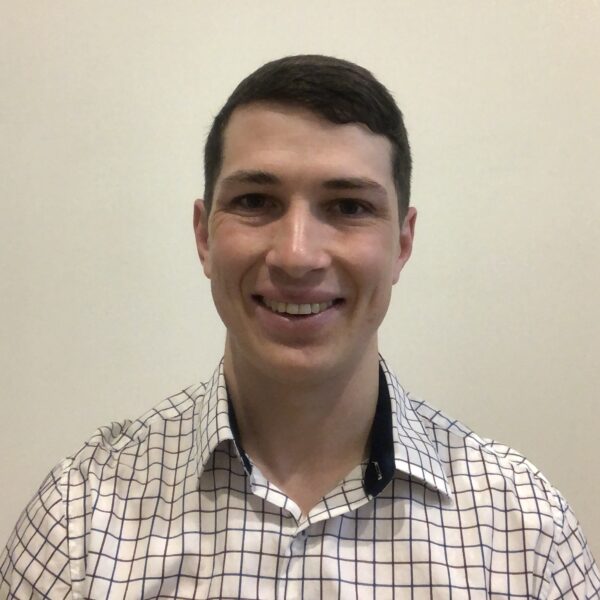
Project Title:
Applications of Functional Data Analysis for Sports Biomechanics |
Partner Organisations:
University of Technology Sydney Australian Institute of Sport CSIRO |
Supervisors:
Dr John Warmenhoven Prof Mark Watsford Prof Paul Wu |
Student Background (academic and personal):
I’ve always loved sport. I grew up playing soccer and always enjoyed the process of improving my performance. That led me to complete an undergraduate degree in exercise physiology and rehabilitation at the University of Canberra after moving to Canberra in 2019 from the Gold Coast. Following my degree, I began working for the ACT Academy of Sport as a sports scientist and strength and conditioning coach. While working I completed my Honours in jumping mechanics at the University of Canberra. Throughout that year I confirmed that I really enjoy the adventure of research and I also met my now primary supervisor John. |
What made you interested in this PhD?
As part of my Honours project John introduced me to some novel methods of handing time-series data called functional data analysis. I’ve always enjoyed working with numbers and I found these methods not only fascinating but could see the benefit they could bring to biomechanical analysis in sport. I was fortunate that this project was being advertised as my Honours was finishing up and the industry partnership with the AIS as well as the training provided by CSIRO made it a really attractive opportunity. |
What are your broad research interests?
Coming from a varied background of performance service disciplines has led me to be interested in a range of topics including sports physiology, training science, rehabilitation, biomechanics, and now statistical methods. |
What is your favourite sporting moment?
The 1904 St Louis marathon. It’s not only an entertaining story but a great reminder of how far sport has come. |
Fun fact about yourself:
I once juggled a soccer ball over 4000 times. |
Mengmeng Wu
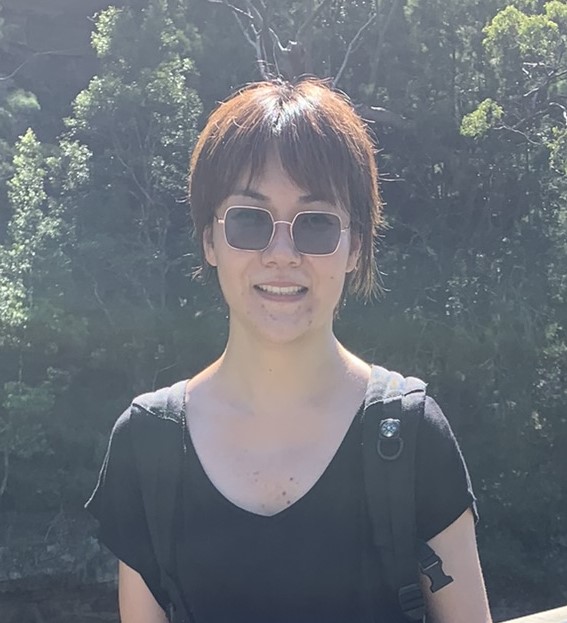
Project Title:
Discovering novel strategies with Reinforcement Learning. |
Partner Organisations:
Australian Institute of Sport Queensland University of Technology |
Supervisors:
Assoc. Prof. Simon Denman Dr. Tharindu Fernando Dr Kien Nguyen Thanh |
Student Background (academic and personal):
Mengmeng was born in the capital of China Beijing. She finished her Bachelor's degree in Electronics Engineering from Beijing University of Technology, where she graduated with top honours. She then went on to complete her Master's degree with distinction in Signal Processing and Communications at University of Edinburgh. She has worked in the financial sector in both China and Australia after graduation in the past few years. She moved to Brisbane to complete her PhD at QUT last year. |
What made you interested in this PhD?
For the past few years, I have been working in the financial industry, but my true passion has always been in the field of machine learning, in particular, applying algorithm to develop with strategies. Previously, I have utilized basic machine learning techniques for horse racing and stock market predictions. I felt incredibly excited when I discovered this project involving the utilization of reinforcement learning in the sports industry. I believe the sports domain offers ample opportunities for efficient exploration and innovative application of reinforcement learning. |
What are your broad research interests?
I will seek to develop novel reinforcement methods and explore how these methods can be used within a sporting context to discover new sporting strategies. Such as efficiently incorporate information from external simulation tools and imitation learning into a RL pipeline. |
What is your favourite sporting moment?
Liu Xiang made history by winning the gold medal in the men’s 110m hurdles during 2004 Athens Olympic, becoming the first Chinese male athlete to win an Olympic gold in track and field. |
Fun fact about yourself:
I have had the pleasure of studying in some stunning cities, such as Beijing, Copenhagen, Edinburgh, Melbourne and Sydney, looking forward for the new adventures in Brisbane. |
Isabela Aurellado
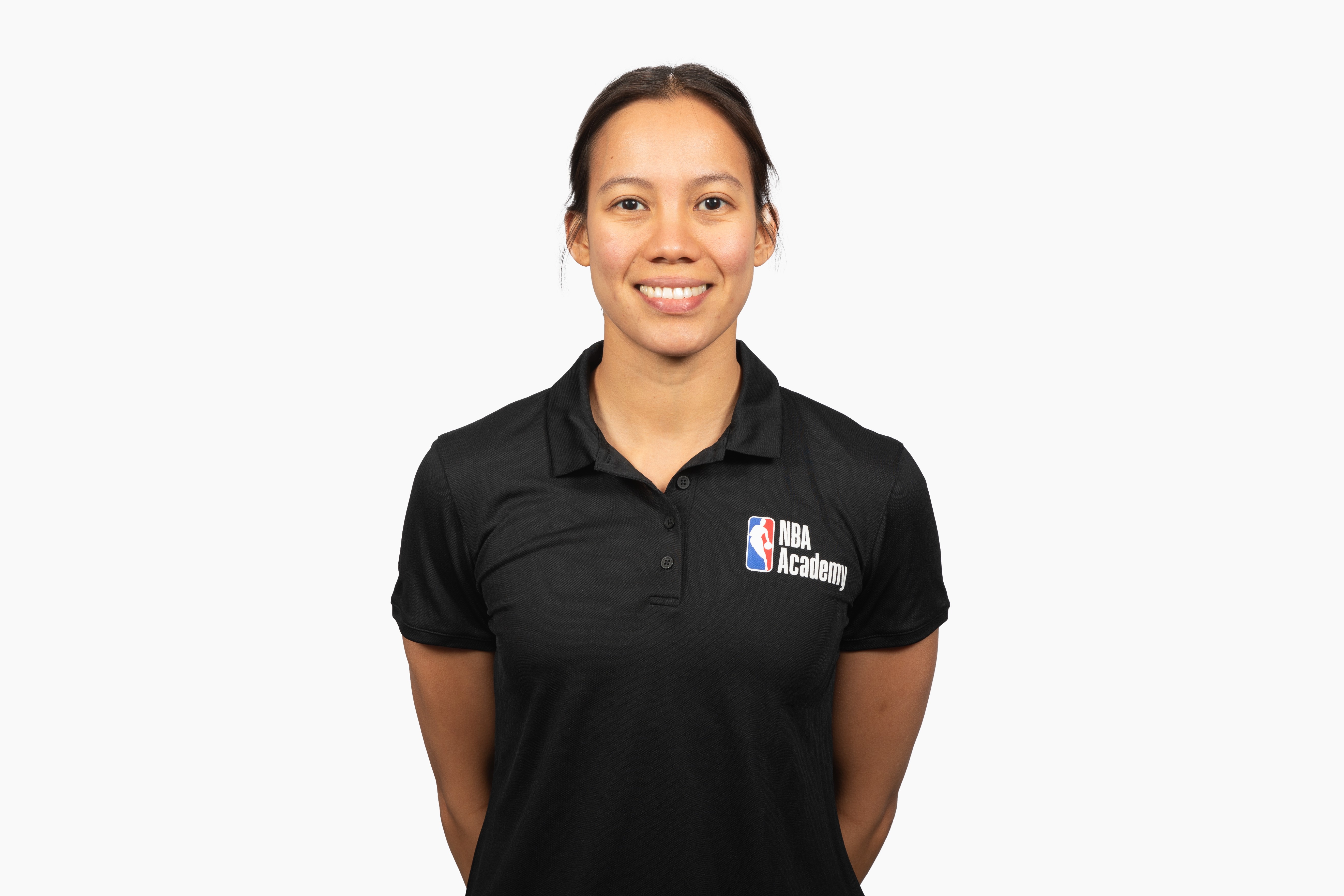
Project Title:
From the Academy to the Big Leagues: An Exploration of Coaching Paradigms, Athletes' Perception of Coaching Efficiency and Skill Performance |
Partner Organisations:
NBA Global Academy |
Supervisors:
Hugh Fullagar, Rob Duffield, Andrew Murray |
Student Background (academic and personal):
Isay Aurellado is a sports scientist serving in an embedded PhD role at the University of Technology Sydney and the NBA Global Academy at the Australian Institute of Sport in Canberra. Her research explores skill acquisition in basketball, with a focus on shooting in dynamic environments, and examines how technology can be applied to monitor, assess, and enhance athletic performance. Beyond her research, Isay contributes to athlete load monitoring at the Academy, working closely with Performance and Medical staff to optimize player health and performance. She earned her Bachelor of Sport Science from the University of the Philippines, Diliman, where she competed as a student-athlete in basketball. She also holds a Master of Science in Kinesiology, specializing in Motor Behaviour and Exercise and Sport Psychology, from Texas Tech University. With her diverse educational background and practical experience, Isay brings a holistic perspective to sports science, integrating research, technology, and athlete-centered approaches to foster development and performance in basketball. |
What made you interested in this PhD?
I have worked with individuals across a wide range of skill levels, sports, ages, and industries—from clinical settings to the general population and elite athletes—focusing on enhancing health and performance through a holistic approach. When this position was advertised, it perfectly aligned with my skill set and the professional path I wanted to pursue, specifically working with developmental elite basketball athletes. Having played basketball in college and competed at the highest level possible during my time, I understood the demands of the sport firsthand—albeit from a different perspective due to gender. Learning that this role was in collaboration with the NBA made it even more special, as it presented a chance to pursue my childhood dream. I took a shot, applied, and fortunately, I was selected. |
What are your broad research interests?
The psychology of behavior has always piqued my interest, particularly in the health and athletic space. Initially, I aspired to become a doctor, but during my pre-medical studies in Sport Science, I realized that prevention is often better than cure. This perspective led me to see physical literacy—not just for the general population but also in elite performance—as a powerful tool in addressing many of the leading preventable lifestyle diseases people suffer from today. |
What is your favourite sporting moment?
I think every time a Filipino athlete succeeds on the international stage, it resonates deeply with our culture. We take immense pride in celebrating the achievements of our fellow kababayan, as these moments—though rare—hold great significance and bring a strong sense of national pride. |
Fun fact about yourself:
This might not be fun for everyone, but for me, it is—I can be very competitive. |
Eva Nates
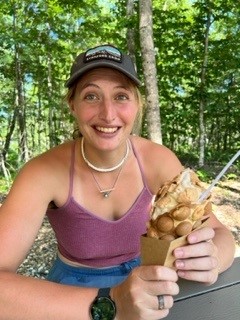
Project Title:
Elite Rowing Biomechanics |
Partner Organisations:
Rowing Australia, University of Technology Sydney |
Supervisors:
John Warmenhoven, Tony Rice |
Student Background (academic and personal):
Eva grew up outside of Philadelphia in the United States. She has thoroughly enjoyed her first few months in Australia and is excited to call Canberra home. Eva attended Stanford University while pursuing her undergraduate degree in mechanical engineering and competing for their NCAA Division I Rowing Team. She also went to Massachusetts Institute of Technology for a master’s degree in mechanical engineering, where she researched trick classification computer vision techniques with the Australian Cycling BMX Freestyle team. While in Cambridge, she continued rowing at Riverside Boat Club. Eva thrives when she is outside, whether rowing, hiking, running, biking, or swimming. She also loves baking (and eating) sweet treats. |
What made you interested in this PhD?
I was very interested in the embedded nature of this PhD since I was looking for hands on Sports Science experience. When the opportunity arose with the rowing team, it seemed like a perfect fit. Plus, I was looking to live abroad, and the AIS is an unparalleled organization, there is so much to learn in this unique environment. |
What are your broad research interests?
Women’s sports Biomechanics Big data in elite sport Computer vision/ event auto-detection AI ethics Environmentalism Social impact of sport |
What is your favourite sporting moment?
2018 Super Bowl Philly Special J also 2022 Pac-12 Rowing Championships |
Fun fact about yourself:
I solo hiked around Mt. Rainier for a week. |
Jordan Cassidy
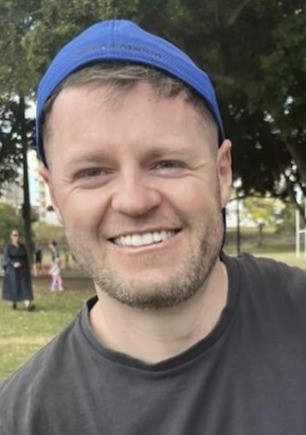
Project Title:
Exploring methods to support coach learning in skill acquisition. |
Partner Organisations:
QUT, QAS, AIS |
Supervisors:
Dr. Adam Gorman; Dr. Vince Kelly; Dr. Michael Maloney; Dr. Scotty Russell |
Student Background (academic and personal):
BSc: Sports Science with Exercise Physiology (2011-2015) MSc: Performance Coaching (2019 – 2021) MPhil: Skill acquisition and coaching (2022 – 2024) PhD: Skill acquisition and coach learning (2024 – present) I have worked in multiple roles (S&C, Sports Science, PE teacher) in Ireland, UK, Hong Kong, and now Australia. I was fortunate to complete my BSc work placement in WAIS in 2014, which provided an initial insight into working in high-performance sport. After my BSc, I spent 5 years as a sports science and conditioning manager with the Hong Kong rugby union, where I provided sports science, S&C, and skill acquisition support to coaches and athletes. From here I transitioned into a PE teaching position in the UK to gain a taste of working with coaches on the other end of the development-performance spectrum. In Sept 2022, I arrived in Brisbane to start my MPhil in skill acquisition and coaching, which has now transitioned into my PhD where I am co-funded by QUT, QAS, and AIS, to explore how skill acquisition specialists can support coach learning. |
What made you interested in this PhD?
I started exploring skill acquisition in my role as a strength and conditioning coach and particularly applying skill acquisition principles to support the development of agility. Here I started to become more aware of skill acquisition in my own strength and conditioning coaching and sport coaching, and it also enabled me to have more informed conversations with coaches I was working with at the time. I was interested to explore how I could support coaches to become more aware of skill acquisition principles and apply them while recognising the contextuality, conditionality and complexity of coaching. |
What are your broad research interests?
I am interested in how athletes learn to move in sport, how coaches learn, and the development of a practitioner’s judgement and decision-making skills. |
What is your favourite sporting moment?
Miracle at Medinah. The story of the 2012 Ryder cup. |
Fun fact about yourself:
Three sport international representative for Hong Kong (very much a social level) – Gaelic football, hurling, and Australian rules football. |
Chris Court Gold
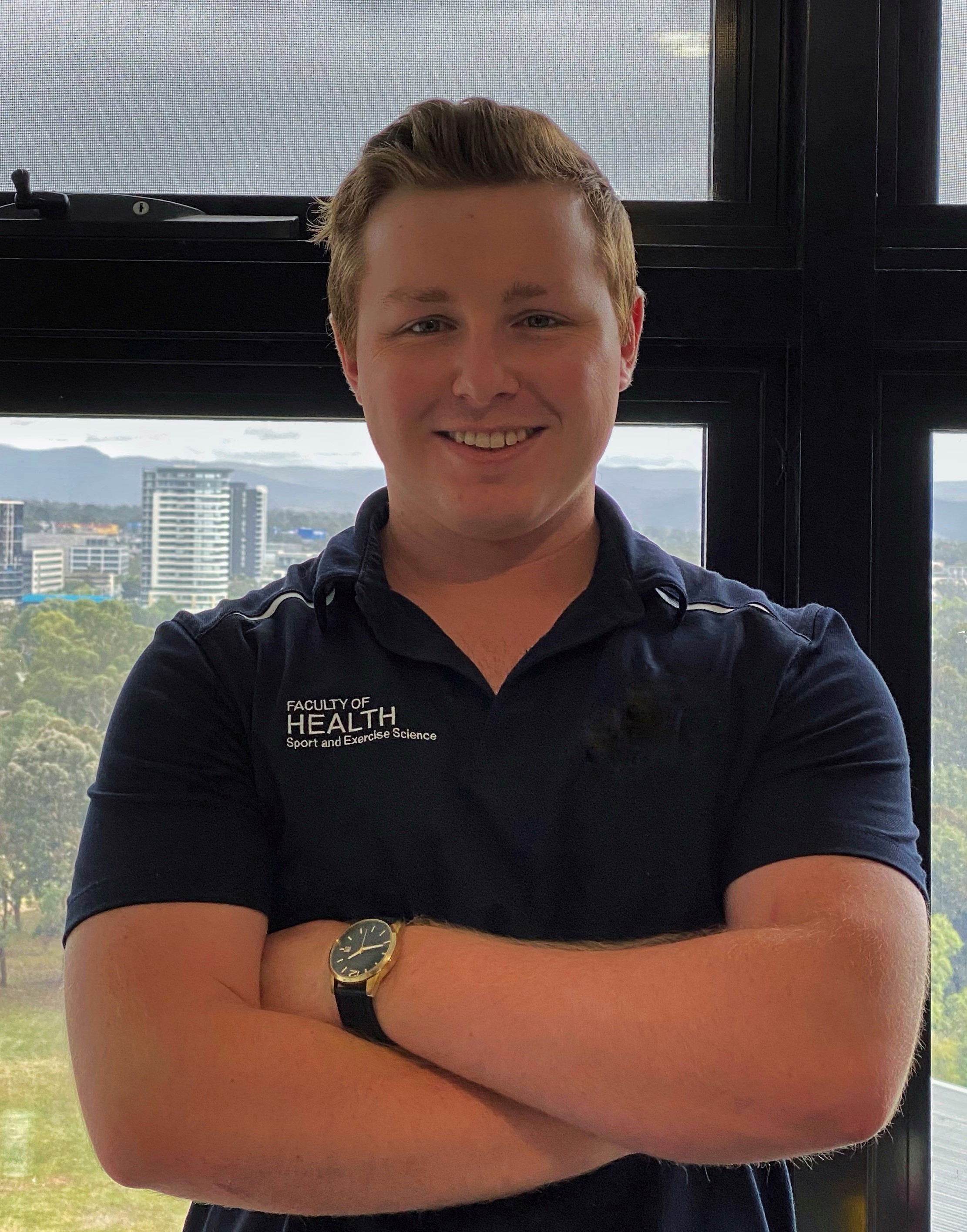
Project Title:
The effects of variability-based learning for skilled team sports |
Partner Organisations:
Queensland University of Technology The Australian Institute of Sport The Australian Sports Commission Volleyball Australia |
Supervisors:
Assoc Prof Adam Gorman Assoc Prof Ian Renshaw Dr Michael Maloney |
Student Background (academic and personal):
I started my academic journey with a Bachelor of Sport and Exercise Science at the University of Canberra from 2019 to 2021. In my final year, I took part in a placement opportunity with Australian Athletics as a biomechanics student. After my placement, I was offered a job with Australian Athletics as a casual biomechanist. At the same time, I transitioned from my undergrad to a Bachelor of Health Science (Honours) with Basketball Australia, the AIS, and the University of Canberra, utilising skill acquisition to explore the effects a defender has on basketball shooting technique. Once I finished my Honours, I continued my academic career with an embedded PhD with the Australian Institute of Sports and the Queensland University of Technology. I am currently 1.5 years into my PhD, my honours paper has been published in the journal Psychology of Sport and Exercise, I am embedded within the Volleyball Australia daily training environment as a skill acquisition specialist, and remain working with athletics as a biomechanics and skill acquisition specialist. |
What made you interested in this PhD?
I thoroughly enjoyed learning about the skill acquisition field in my honours along with the process of scientific research and being embedded in a sport. It was that honours project and the support of my industry supervisor Dr Michael Maloney that gave me the desire to build a career in skill acquisition. |
What are your broad research interests?
Skill acquisition is the field I am most interested in. Within this field, I specialise in variability-based learning designs (i.e., practice variability, contextual interference, differential learning), although I have also tried to get a good grasp on the rest of the skill acquisition literature. I have also spent considerable time learning about qualitative research, single-case experimental designs, and case study designs. |
What is your favourite sporting moment?
St George Illawarra Dragons 2010 Premiership |
Fun fact about yourself:
Apart from sports, I love cooking – My beef ragu is elite |
Andrie Steyn

Project Title:
Jet lag and travel fatigue in elite athletes. |
Partner Organisations:
University of Canberra Research Institute for Sport and Exercise. |
Supervisors:
Dr Brad Clark, Prof Kate Pumpa, Dr Peta Maloney, Dr Dean Miller |
Student Background (academic and personal):
I was born in Durban (South Africa) and completed school in Pretoria. I played cricket from the age of 6 and continued through the cricketing ranks until I made my international debut for South Africa (Proteas) at 17. I then moved to Cape Town for cricket and studies. I completed my undergraduate, honours and master’s degrees in sports science at the University of the Western Cape and Stellenbosch University. My master’s degree looked at Grip strength and kinematic parameters for ball carry distance among high-level female cricket batters. During this 8-year period I continued to play professional cricket for the Proteas and the Western Province Women’s teams. After completing my master’s, I decided to take a gap year to focus on cricket. Halfway through the gap year I decided to pursue a PhD and was lucky enough to receive a 50/50 Women in sport scholarship opportunity in Canberra. I moved over to pursue my PhD in January 2024. |
What made you interested in this PhD?
I was a professional cricketer competing at the national level for 10 years. We often had to travel across the globe to compete in bilateral series or World Cups. We would often land and be expected to perform 2 or 3 days after arriving in a new country which was unrealistic. The opportunity to aid any athlete in jet lag, travel fatigue, or long-distance travel felt like something I would like to be a part of as I have experience regarding the physical and mental toll it has on you as an athlete. |
What are your broad research interests?
My biggest passion will always be cricket or something relating to cricket. In that sense my master’s and PhD topics are directly linked to this passion be it from biomechanics or a physiological perspective. Additionally, any research surrounding high-performance sport regardless of the specific sport will always be of great interest to me. |
What is your favourite sporting moment?
Being from South Africa we’ve been lucky enough to win a few rugby world cups. My favourite one was the 2023 rugby world cup. Supporting the team amongst family, friends, and fellow South Africans throughout the world cup was my favourite as the whole country stood together. From an athlete perspective my favourite moment was when I scored my first hundred for the Proteas in 2017. |
Fun fact about yourself:
I enjoy, camping, hiking, being outdoors, any form of ball sports, music, playing xbox, and travel (probably also helps with the PhD). |